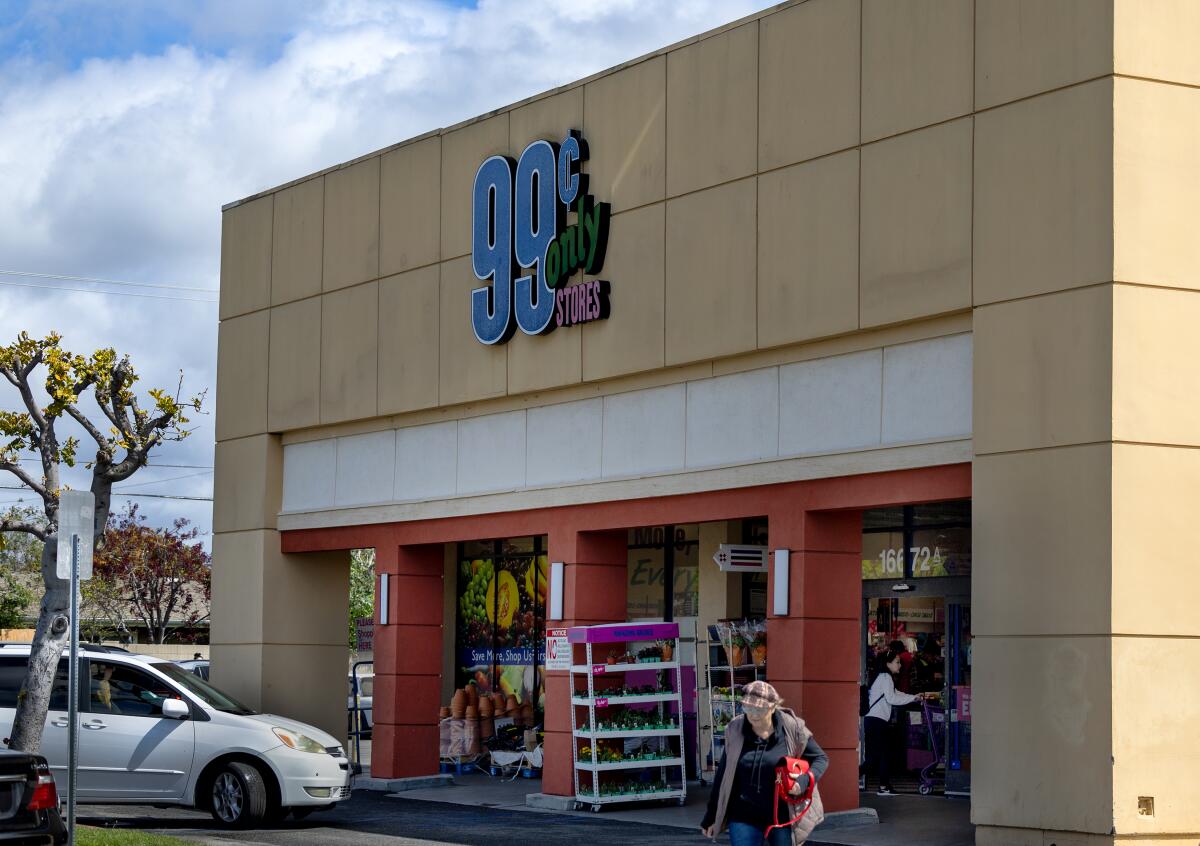99 Cents Only Stores will close all 371 of its stores and wind down its business operations after more than four decades, the City of Commerce discount chain announced Thursday.
“This was an extremely difficult decision and is not the outcome we expected or hoped to achieve,” interim Chief Executive Mike Simoncic said in a statement. “Unfortunately, the last several years have presented significant and lasting challenges in the retail environment.”
He cited multiple factors, including the “unprecedented impact” of the COVID-19 pandemic, shifting consumer demand, persistent inflationary pressures and rising levels of shrink — an industry term that refers to loss of inventory attributed to reasons such as shoplifting, employee theft and administrative errors.
Combined, those issues “have greatly hindered the company’s ability to operate,” Simoncic said.
99 Cents Only has stores in California, Arizona, Nevada and Texas and has about 14,000 employees. The privately held company said it had reached an agreement with Hilco Global to liquidate all of its merchandise and dispose of fixtures, furnishings and equipment at its stores. Sales are expected to begin Friday.
Hilco Real Estate is managing the sale of the company’s real estate assets, which are owned or leased.
The announcement by 99 Cents Only reflects a larger weakness in the dollar-store category, said Brad Thomas, equity research analyst at KeyBanc Capital Markets.
Dollar Tree, a Chesapeake, Va., retailer, announced last month that it was closing 600 of its Family Dollar stores this year and an additional 370 in the next few years, he noted.
“It’s been trying times for many, many retailers,” he said. “What’s interesting is that what started out as a boon to retailers in the pandemic, with all those stimulus checks, quickly turned into a very troublesome time.”
Rising wages, inflation and higher losses due to shrinkage have reduced profits for retailers in a deep-discount sector where margins are already extremely low.
99 Cents Only, with its large base of California stores, has been under particular wage pressure, he said. And it’s at a disadvantage compared with larger chains such as market leader Dollar General, which has a store count close to 20,000 — “a sales base and a store base that is multiple times larger than 99 Cents,” Thomas said.
Customers make their way through the crowded parking lot at a 99 Cents Only store in Santa Monica on Friday. The chain has locations in California, Arizona, Nevada and Texas and employs about 14,000 people.
(Genaro Molina / Los Angeles Times)
Last week, Bloomberg reported that 99 Cents Only was considering a bankruptcy filing as it contended with a liquidity shortfall.
Founded in Los Angeles in 1982 by David Gold, 99 Cents Only popularized the single-price retail concept. At the time, dollar stores were seen as dumping grounds for undesirable products, but the Gold family made the stores bright and well-organized, with good-quality merchandise including groceries and household supplies.
“It was an instant success,” Howard Gold, one of David Gold’s sons, recalled Friday; he and his three siblings all worked at 99 Cents Only. “People thought it was government-subsidized because they couldn’t believe the prices.”
For years, it remained one of the few true “dollar” stores, with items priced at 99 cents or less or grouped to sell for a total of 99 cents.
That changed in 2008 when, faced with fast-rising inflation, soaring food and fuel prices, and a higher minimum wage, 99 Cents Only announced that it was straying from its long-standing price strategy.
Three years later, the company announced that it had agreed to be sold in a deal valued at about $1.6 billion, as investors eyed dollar stores that had grown in popularity during the Great Recession. In 2013, Howard Gold and the rest of the family management team departed the company.
Today, with stores scattered around Los Angeles County — among them in Hollywood, Silver Lake, Mid-Wilshire, Santa Monica, Thai Town, North Hollywood and Glendale — the closure of 99 Cents Only will leave a number of large vacant properties in prime locations.


A 99 Cents Only store in Huntington Beach on Friday.
(Allen J. Schaben / Los Angeles Times)
“It’s very sad on many levels, and I’ll just leave it at that,” Gold, now retired and living in Studio City, said of the decision to close the chain his father built.
Other major retailers have also announced store closures in the region lately, including REI in Santa Monica, Macy’s in Simi Valley and several Rite Aid locations.
99 Cents Only did not respond to requests for comment.
Nicolas Kolesnikow, a retired teacher who lives in Westchester, said he was shocked to hear the chain was going out of business. He shops at a 99 Cents Only about four blocks from his house several times a week.
“It’s almost like a corner store for me,” said Kolesnikow, 82.
He might stop by and pick up milk if he runs out, and for longer trips will buy household items and produce such as tomatoes, cucumbers and cilantro before visiting a traditional supermarket with a larger selection.
Kolesnikow said he noticed that some products had become much more expensive in the last year, though there were still bargains.
“I found their prices were working their way up to regular prices,” he said, “and there were fewer shoppers.”


